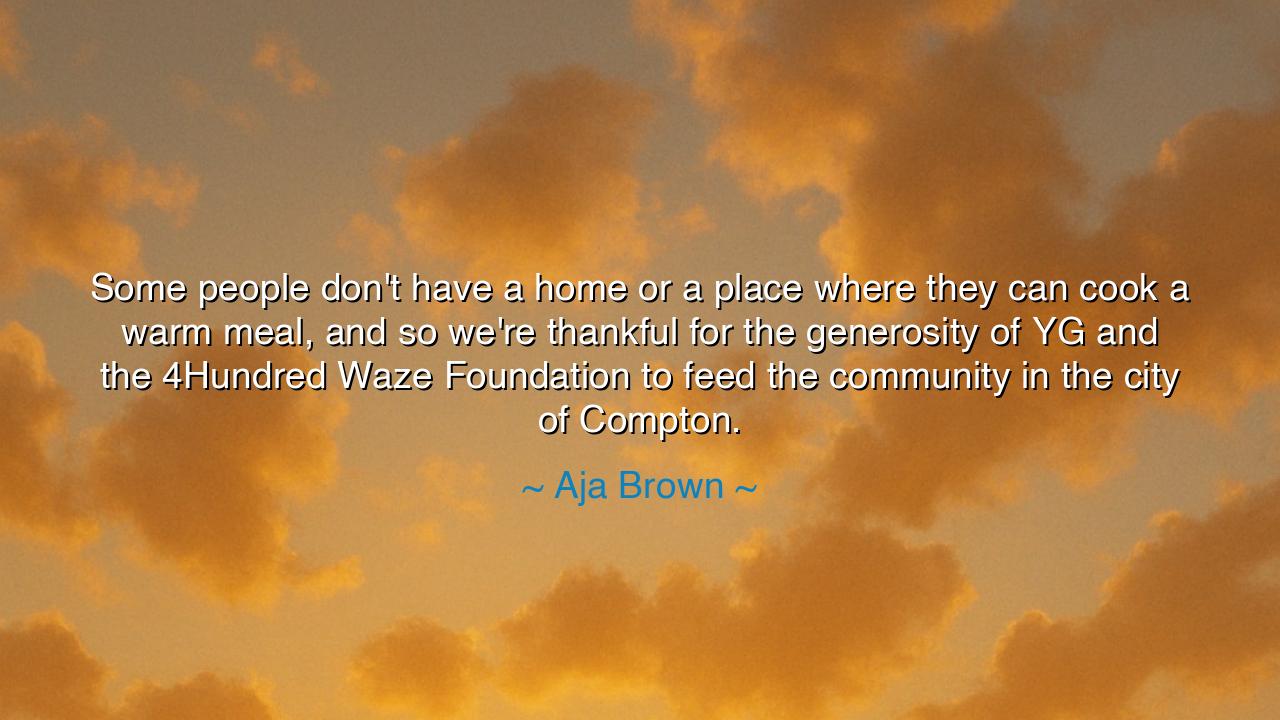
Some people don't have a home or a place where they can cook a
Some people don't have a home or a place where they can cook a warm meal, and so we're thankful for the generosity of YG and the 4Hundred Waze Foundation to feed the community in the city of Compton.






In the words of Aja Brown, spoken with compassion and gratitude, we hear a truth that has resonated across every age: “Some people don’t have a home or a place where they can cook a warm meal, and so we’re thankful for the generosity of YG and the 4Hundred Waze Foundation to feed the community in the city of Compton.” This is no simple statement of thanks. It is the lifting up of a light in the midst of want, a proclamation that even in hardship, the hand of generosity can restore dignity and hope.
The words speak first to the plight of the homeless and the hungry, those who wander without hearth or fire, without the simple security of bread on the table. Throughout history, such souls have always existed—reminders of the fragility of life, and of society’s sacred duty. A warm meal is more than food; it is comfort, humanity, and remembrance that even the forgotten are seen. To lack such a meal is to feel invisible. To be given one freely is to feel human again.
In ancient times, it was said of Cyrus the Great, king of Persia, that he commanded his generals to ensure that even the poorest were not left without sustenance in times of famine. He understood that a ruler’s strength was measured not only in armies and gold, but in how he cared for the least of his people. Likewise, the generosity of YG and the 4Hundred Waze Foundation continues that eternal truth: that greatness lies not in wealth hoarded, but in wealth shared for the good of the community.
There is also in this quote a recognition of gratitude. Aja Brown does not merely note the act of feeding the hungry—she raises it as an example to be honored. For gratitude magnifies generosity, and when thanks is given, it teaches others to see the nobility of such deeds. This is how compassion spreads: one act inspires another, and the chain of kindness grows stronger. In this way, gratitude is not passive, but powerful—it transforms one gift into many.
The city of Compton, long known for its struggles, is also a city of resilience, where voices rise from hardship into song, into art, into movements that shape culture itself. To feed the hungry here is not merely to fill stomachs, but to strengthen the roots of a people who have endured. It is to say: you matter, your life is worth sustaining, your place at the table will not be denied. Such words and acts kindle not only survival, but hope.
From this we draw a timeless teaching: that to give even the smallest act of kindness—a meal, a cloak, a listening ear—is to participate in the oldest heroism of humankind. Not all may command armies or build empires, but all may give. And in giving, we plant seeds of resilience in the lives of others, which may in turn grow into forests of strength for generations.
Practically, let each of us look around: Who is hungry near us? Who is without warmth or welcome? To follow this teaching is to act—not only in vast gestures of philanthropy, but in the simple offering of food, in supporting local shelters, in volunteering, in speaking words of dignity to those who feel unseen. For in every warm meal shared, we become part of that same chain of generosity that binds past to present, and present to future.
Thus, let the words of Aja Brown be carried as a torch: though some may lack a home or a place to cook, none should lack the compassion of their fellow beings. For as long as there are those who give, as long as there are those who remember to be thankful, the city—any city—will endure, and its people will rise with renewed strength. Generosity is the fire that warms not only the body, but also the spirit, and in tending this fire, we become guardians of humanity itself.






AAdministratorAdministrator
Welcome, honored guests. Please leave a comment, we will respond soon